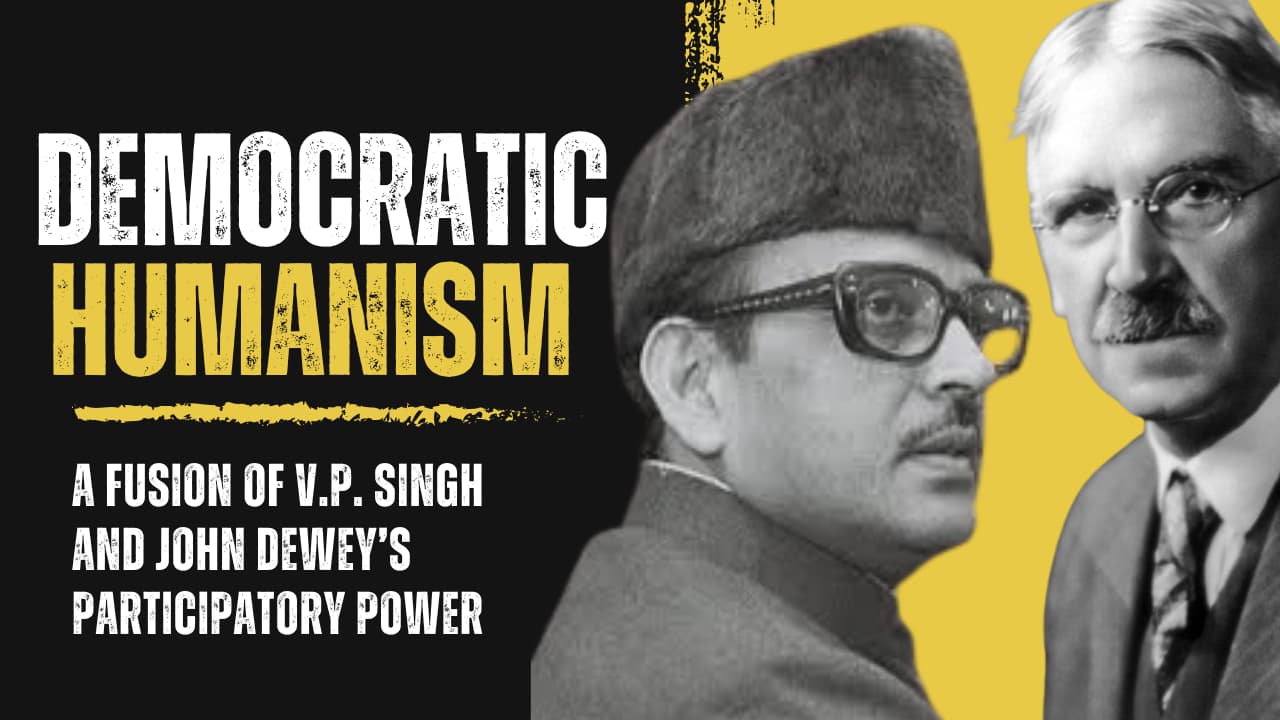[22] Democratic Humanism: A Fusion of V.P. Singh and John Dewey’s Participatory Power
V.P. Singh’s vision for India was deeply rooted in social justice, decentralized governance, and ethical leadership. His speeches and policies reflected an attempt to create a democracy where power was not concentrated in institutions but shared with the people. A parallel vision can be found in the philosophy of John Dewey (1859-1952), an American pragmatist who argued that democracy is not just a system of government but a way of life. Dewey saw democracy as participatory, experimental, and ever-evolving, just as Singh envisioned governance as a continuous dialogue between the state and its citizens.
By fusing Dewey’s theory of participatory democracy with Singh’s Democratic Humanism, we arrive at a philosophy of active civic engagement, economic justice, and ethical leadership, where democracy is an ongoing social experiment rather than a fixed political structure.
1.Decentralized Power: From Representation to Participation
Both Singh and Dewey reject the passive model of democracy, where citizens only engage in politics through voting. For them, true democracy is participatory, not merely representative.
Dewey, in his work Democracy and Education, argued that political power must be deeply embedded in everyday social life, ensuring that education, governance, and civic responsibility are interconnected. Similarly, Singh believed that Panchayati Raj institutions (village councils) were not just administrative units but training grounds for democratic participation. He envisioned a democracy where people exercise real decision-making power at the grassroots level, rather than waiting for politicians to act on their behalf.
Thus, Democratic Humanism calls for a shift in democratic theory from delegation to direct participation. The people should not just be governed; they must govern themselves. The Gram Sabha (village assembly) and decentralized institutions in Singh’s framework serve the same function that Dewey envisioned for schools and civic organizations—as spaces where democracy is practiced, learned, and continuously shaped.
2. Social Justice as a Democratic Imperative
Dewey believed that democracy is not merely a political system but a moral and social ideal. He argued that true democracy must correct historical injustices, ensuring not just equal rights but equitable opportunities.
Singh’s commitment to affirmative action (Mandal Commission) aligns with Dewey’s belief in social reconstruction—the idea that democracy must actively dismantle structures of oppression. Singh did not see governance as neutral; he believed the state must intervene on behalf of marginalized communities to ensure they had the same starting point as the privileged.
This ethic of justice demands that democracy be measured not by the strength of its institutions but by the dignity it grants its weakest members. Dewey wrote that without social and economic justice, democracy becomes an empty shell. Singh’s policies on rural development, economic decentralization, and land reforms were attempts to fill democracy with real substance—ensuring that political power was matched by material well-being.
3. Ethical Governance: The Responsibility of Leadership
Dewey and Singh shared a common belief: Democracy is not self-sustaining; it requires ethical leadership and an informed citizenry.
Dewey was deeply critical of authoritarian tendencies, arguing that governments must be transparent, accountable, and continuously evolving. Singh’s insistence on the Right to Information (RTI) and judicial independence reflects a similar conviction that institutions must be kept in check by public scrutiny. Both thinkers rejected the elitist notion that only a select few should rule, advocating instead for a system where governance is fluid, responsive, and open to change.
For Singh, as for Dewey, leadership was not about authority but service. A true leader, Singh believed, does not dictate from above but facilitates empowerment from below. Ethical governance, in this framework, is not merely about avoiding corruption; it is about ensuring that power serves the moral and social progress of the people.
4.Democracy as a Continuous Experiment
Dewey’s pragmatism teaches that no democratic system is final or perfect—it must be constantly tested, revised, and improved. This aligns with Singh’s understanding of governance as an evolving social contract, not a static political arrangement.
Singh’s government was a coalition of diverse ideological groups, reflecting his belief in adaptive, consensus-driven decision-making. Instead of rigid, top-down policies, he sought dialogue and reform, embodying Dewey’s principle that democracy is an ongoing process of negotiation and learning.
Conclusion: Democratic Humanism as a Living Ideal
By integrating Singh’s vision of decentralized power with Dewey’s participatory democracy, we arrive at a philosophy of Democratic Humanism—a framework where:
- Democracy is not just a system of elections but a way of life, embedded in education, local governance, and social structures.
- Justice is not merely legal equality but the active correction of historical injustices, ensuring that all citizens have equal opportunities.
- Leadership is not about ruling but facilitating empowerment, making government accountable to the people.
- Democracy is never finished—it must be constantly rethought, reformed, and revitalized.
In a world where democracy is often reduced to electoral politics, the fusion of V.P. Singh and John Dewey offer a vision of democracy as an ethical, participatory, and transformative force—one that liberates not just individuals but entire communities.

